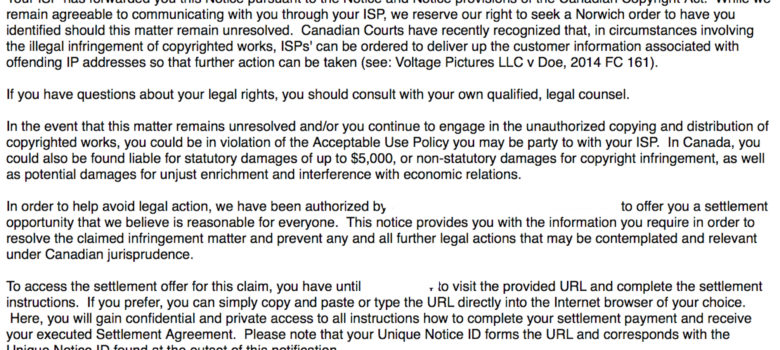Canada’s copyright notice-and-notice system has been the subject of controversy and misuse since the moment it launched in 2015. The system was intended to educate the public on copyright and reduce infringing activity through awareness (experience indicated the approach worked), but has been misused by copyright owners who have used it to send millions of settlement demands to unsuspecting Canadians. The misuse of the system was even the subject a question to Prime Minister Justin Trudeau during question period earlier this year.
While fixing the problem should be relatively easy – new regulations could prescribe precisely what may be included in the notice or there could be a prohibition on including settlement offers or demands within the notices – but the government has dragged its feet on the issue. The Conservatives knew there was a problem, but instead chose to prioritize extending the term of copyright for sound recordings after a behind-the-scenes lobbying campaign. The Liberals have similarly not acted on the issue, putting Copyright Board reform ahead in the queue.
The issue may have languished, but documents recently obtained under the Access to Information Act confirm that government officials believe that sending settlement demands is inconsistent with the original policy intent. Moreover, the documents reveal that the Ministry of Innovation, Science, and Economic Development has been receiving anxious calls for consumers and that it is aware of industry concerns about fraudulent notices by parties impersonating copyright holders. The government memo from 2016, written as advice to ISED Minister Navdeep Bains, states:
Soon after the regime entered into force in January 2015, controversy arose over the practice of some copyright owners (or their agents) of including settlement demands within their notices, urging the consumer to avoid threatened legal action. The sending of such notices could lead to abuses, given that consumers may be pressured into making payments even in situations where they have not engaged in any acts that violate copyright laws.
The memo continues:
Officials signalled to stakeholders early on that the sending of such notices to consumers is not consistent with the underlying policy intent, and many of the participants in the regime, including key organizations representing copyright owners, have indicated that they do not support the use of settlement demands. Internet intermediaries complain, however, that the current legislative framework does not expressly prohibit this practice and that they feel compelled to forward on such notices to their subscribers when they receive them from copyright owners.
The memo notes that “consumer anxiety over such notices has been apparent in inquiries received from ISED’s call centre and in media reports.” The department also raises concerns about fraudulent notices:
According to ISPs, this problem is compounded by instances of fraudulent notices being sent to consumers by individuals impersonating actual copyright owners. Such notices are likely being sent to consumers in the hopes of extracting payments under the guise of settling infringement claims.
Given the awareness of the misuse of the system and vulnerability of thousands of Canadians, why has the government done nothing to address the issue? Officials know the system is being misused and that consumers are being victimized by unwarranted and potentially fraudulent settlement demands. Yet the misuse of notice-and-notice has been going on for 2 1/2 years with no action on what amounts to an easy fix. There is no reason to wait another year or two for the copyright review to run its course to address the issue. If the government can prioritize fixing the Copyright Board, it can also ensure that Canadians are no longer unfairly targeted through a system prone to abuse.








thanks for sharing
not enough clamor to cover the groping;
not grouping; groping. rape resocialization is a standard ploy.
(data, hardware, software and management of streams) There can only be one, right?
saving the public from fraudsters is a risky political move.
welcome back, mr. guiest.
and no, I can’t read my own notes after a day or two.
Pingback: Monday Pick-Me-Up « Legal Sourcery
Фоном для него может послужить один из вышеописанных видов неглубокого рельефа как оформить стены своими руками.
Pingback: IP News September | Centre for Intellectual Property Policy
Pingback: ‘Terrified’ 60-year-old woman told to pay up for illegally downloading porn – Business – News
Pingback: 'Terrified' 60-year-old woman told to pay up for illegally downloading porn - Times of News Canada
Pingback: ‘Terrified’ 60-year-old woman told to pay up for illegally downloading porn | CSIS News
Pingback: ‘Terrified’ 60-year-old woman told to pay up for illegally downloading porn – MaharlikaNews @ykhy CW051017
Pingback: ‘Terrified’ 60-year-old woman told to pay up for illega… – Breaking
Pingback: ‘Terrified’ 60-year-old woman told to pay up for illegally downloading porn | MediaNavy
Pingback: ‘Terrified’ 60-year-old woman told to pay up for illegally downloading porn | Viral News
Pingback: ‘Terrified’ 60-year-old woman told to pay up for illegally downloading porn | Gap4.com
Pingback: The Fight for Fair Copyright Returns: Canadian Government Launches Major Copyright Review - Michael Geist